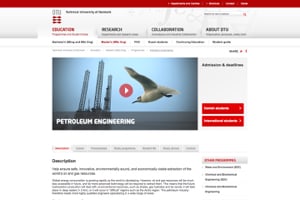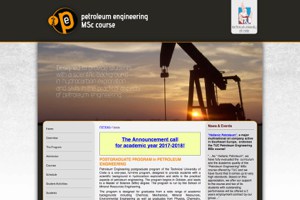Introduction: Our college and university history is something that many of us hold close to our hearts. Each one of us might be a little biased, but this page is an attempt to list the very best schools for career in the O+G industry. Once published, we expect and look forward to feedback. We’d like to think that this page will be kept fresh and updated over the years so that anyone finding it can get the most accurate review of the top universities.
If you see a mistake, omission, or even if you think that one of the institutions is not worthy of being on the list – Please let us know! You can do this in the comments, though our contact page or on social media. Whilst this page has been researched and reviewed, the idea of perfection appeals to us, to keep the information fresh and accurate.
The best education for oil and gas qualifications
No-one knows whether the oil and gas industry has reached peak supply or demand. It’s impossible to know whether it’ll be a flourishing career choice for the next decade or two.
Many oil companies, analysts and investment banks predict a healthy future for the industry for the next 2-30 years. The problem with (any) predictions, is that they often turn out to be wildly inaccurate.
Students who are currently studying for an oil career might question their choice. Students who graduated in 2012-13 would have certainly felt better about their decision. For the purposes of choosing a rewarding career and healthy income for a lifetime, it’ll make little difference whether your timing was before, during or after a crash.
What’s more important might be the trajectory of the industry as a whole. With the advances in AI, robotics and alternative energy, it’s impossible to predict the overall trajectory of the oil and gas industry…
The same applies to every other industry too!
A tough decision…
The decision about which course to take, or whether to go back for higher education is a difficult one. At some point, the more advice you seek, the more confused you’re likely to get. You’ll get to the stage where you need to stop looking for advice, and go with your instincts. After all, no-one else will study or take the exams for you.
It might seem a bit flaky to suggest that you go with your gut, but this is recommended only after you’ve researched fully.
At some point, you have to listen to that quiet voice in your heart, gut or back of mind, make a decision and then own it.
Assuming you’ve decided to study for an oil and gas related qualification, what then?
The course you choose, and the place you study could be tremendously important. Even if the industry contracts by 50%, there will still be a job for those who studied at the most acclaimed institutions. There will be a place for those who achieved the highest grades.
The acclaimed institution, and the high grades can be the same thing… Because some colleges and universities already have the best lecturers, facilities and track records.
By choosing the right place to study, you’ll be rubbing shoulders with other future industry leaders.
In your previous education, you’ll have experienced the flow state achieved where you have a system, equipment, peers and teachers that are geared up and committed to excellence. A culture of success helps you to achieve a performance level that is outside your comfort zone, with results that reflect this!
Your choice of academic destination could be the difference between cognitive dissonance, feeling a lack of direction, then dropping out or getting a bad grade…
… Or spending the best time of your life with people who carry you through your career, as you will do for them. You’ll get into the zone of high performance where second best is a fail, and future employers will sense this in you from the first impression onwards.
Here are the drillers.com top picks for European University Oil and Gas courses:
(Deliberately in no particular order)
(+ Click on website images to go to the relevant websites)
The University of Aberdeen
 Aberdeen is one of the top oil and gas cities in the world, historically because of the close proximity to the North Sea oil fields. It’s likely that the status continues into the future, due to the wealth of talent, knowledge and experience of the people based there.
Aberdeen is one of the top oil and gas cities in the world, historically because of the close proximity to the North Sea oil fields. It’s likely that the status continues into the future, due to the wealth of talent, knowledge and experience of the people based there.
The University of Aberdeen is the only university in Scotland to offer an undergraduate degree in Petroleum Engineering, and also general engineering modules. You can also study the Petroleum Engineering Masters degree. Also on offer is a Subsea Engineering Masters Degree, that’s respected in the industry as a solid course.
IFP Energies nouvelles (IFPEN)
(Formerly called IFP (Institut Français du Pétrole)
France’s IFPEN has a substantial research facility, which is important for the reputation and performance of any academic institution. Universities that research heavily tend to be at the cutting edge of technological breakthroughs.
Originally the school was known as the Institut Français du Pétrole (IFP), and has a long track record of achievement and excellence. Now, in recent years France has adopted a very forward looking approach to the energy mix, and modern alternative energy. For this reason, the school has expanded into sectors such as energy efficiency, biofuels, and new energy technologies (NET’s).
As a logical progression of this, the institution has re-branded as IFP Energies nouvelles (IFPEN). Now, rather than the IFP being the main umbrella, it’s a specialised graduate school within the IFPEN framework. This makes complete sense as our energy options around the world expand.
Historically, staff and students here have been responsible for a number of industry advancements such as the Rock-Eval technique to determine the oil potential of sedimentary rock. Yves Chauvin is a researcher at IFP who was awarded a Nobel prize for chemistry in 2005.
Currently, the IFP section in particular is extremely dynamic and practical in its approach to industry. For example, 80% of IFP School students are sponsored and funded by around 50 French and foreign companies. This is an incredible achievement, and means that the best and brightest of the next generation are not excluded from human advancement.
Jouanah Ghori, the IFPEN/IFP School Communications Officer had this to say about the IFP department:
The IFP School provides young engineers with advanced graduate programs leading to professional qualifications in the fields of energy and transport. It has a dual ambition: to provide industry with the skills it needs today and to train the future energy transition players. To achieve these objectives, it focuses on a high level of industrial integration and adopts a resolutely international approach.
Since the whole curriculum at IFPEN is energy related, we won’t link to particular courses, but here is a link to the relevant page to the IFP selection of courses that we’re highlighting.
Delft University of Technology
 Delft University is the largest public technical university in the Netherlands. Delft regularly appears in top global rankings for many sectors of technology. They run a Masters program that combines Petroleum Engineering with Reservoir Geology.
Delft University is the largest public technical university in the Netherlands. Delft regularly appears in top global rankings for many sectors of technology. They run a Masters program that combines Petroleum Engineering with Reservoir Geology.
Other subject matters covered include Geo-Resource Engineering, Geo-Engineering, Applied Geophysics, Geoscience and remote sensing, and Environmental Engineering.
Here’s a link to the section of the Delft website that covers a Bachelors Degree in Petroleum Engineering.
Montanuniversität Leoben
 The Department of Petroleum Engineering (DPE) at Montanuniversität Leoben is one of Austria’s best academic institutions and is held in high regard in the oil and gas industry.
The Department of Petroleum Engineering (DPE) at Montanuniversität Leoben is one of Austria’s best academic institutions and is held in high regard in the oil and gas industry.
A strong research department and a low student to faculty ratio will help ensure that you’ll have the opportunity to be rubbing shoulders with the right people.
The (DPE) at Montanuniversität Leoben has aligned itself with many important industry partners. These range from companies, to organisations, and other educational institutions. This means that you can start networking years before actually entering the industry. A higher chance of job opportunities or internships will result from networking.
The University of Stavanger
 The University of Stavanger is highly rated as one of the best places to study petroleum engineering in Norway. Norway itself is a strong player in the global oil and gas industry. In relation to workers, companies, education, and of course access to a number of rich oilfields within its territory.
The University of Stavanger is highly rated as one of the best places to study petroleum engineering in Norway. Norway itself is a strong player in the global oil and gas industry. In relation to workers, companies, education, and of course access to a number of rich oilfields within its territory.
The university has around 10.000 students, 10% of which have an international background. The University of Stavanger has strong connection within the oil and gas industry, and with the headquarters of 26 international oil and gas companies in the region. Finding a university that is heavily involved in the industry can only offer you benefits in attaining work later.
The university offers Master’s programmes in English, in a wide range of courses, including Petroleum Engineering, Offshore & Environmental Technology and Petroleum Geoscience Engineering.
The Norwegian Government chose the University of Stavanger for the hosting of Norway’s new cutting-edge petroleum research centre for Improved Oil Recovery. The degree in Offshore Technology is focused on industrial asset management, risk management and issues related to the design of offshore installations for the oil and gas industry.
Heriot Watt Institute of Petroleum Engineering
 Scotland’s Heriot Watt institute of Petroleum Engineering is well situated to research and study opportunities along the UK continental shelf and frontier basins.
Scotland’s Heriot Watt institute of Petroleum Engineering is well situated to research and study opportunities along the UK continental shelf and frontier basins.
The Heriot Watt Institute of Petroleum Engineering is world renowned as a leading training and research facility. It has frequently won awards such as the Queens Anniversary Prize in 2015. This award was given in recognition of practical innovation and research that has been applied to real life industrial situations.
The ongoing list of industrial sponsors, academic partnerships, and spin off companies are testament to the practical achievements being accumulated.
Imperial College
 Imperial College has a lot going for it in general, the South Kensington, (London) location is a perfect place to spend a year or two. This means that the college has international appeal and has one of the most diverse international student background profiles in the world.
Imperial College has a lot going for it in general, the South Kensington, (London) location is a perfect place to spend a year or two. This means that the college has international appeal and has one of the most diverse international student background profiles in the world.
This of course means little if the course that you plan to study is sub par. This certainly isn’t the case, and if you end up graduating with a Masters Degree in Petroleum Engineering, Petroleum Geoscience from Imperial, you’ll have a very enviable qualification. There’s also an opportunity to study an MSc in Metals and Energy Finance, and the more common undergraduate degrees as well.
As with all of the universities on our list, a key feature is the relationship with employers and researchers. This is crucial in the career acclimatisation process, as well as the chance of a job straight after you finish. In this regard, as a student, you’ll have the opportunity to attend, or get involved in the Imperial College Oil & Gas Forum.
The Imperial College Oil and Gas Forum was started in 2014 by Tino Millar, a postgraduate student there. It’s already Europe’s largest event of its kind, in 2015 it attracted 300 delegates from 41 Institutions and companies, consisting of 47 nationalities.
Norwegian University of Science and Technology (NTNU)
 Norway had to get a mention in this list of top universities for an oil and gas career, in fact, we felt that it warranted two mentions. Norwegian oil and gas workers have a great reputation for discipline, knowledge and a steady manner.
Norway had to get a mention in this list of top universities for an oil and gas career, in fact, we felt that it warranted two mentions. Norwegian oil and gas workers have a great reputation for discipline, knowledge and a steady manner.
There are only 8 universities in Norway and NTNU (Norges teknisk-naturvitenskapelige universitet) is the biggest, and as the name suggests is tailored towards natural science, technology and engineering.
NTNU offers some interesting courses that are dedicated to oil and gas such as the Oil and Gas Technology Bachelors degree. This course also has a part time experience based version.
Whilst the university attracts around 10% of its students internationally, bear in mind that many of the courses require that you speak Norwegian, or at least a Scandinavian first language. As is the case with many job postings in based in Norway and with Norwegian companies in general.
Robert Gordon University
 Robert Gordon University (RGU) in Aberdeen, Scotland regularly receives praise and accolades. It’s one of the most modern and progressive universities in the UK, and its alumni tend to fair well when joining the workforce.
Robert Gordon University (RGU) in Aberdeen, Scotland regularly receives praise and accolades. It’s one of the most modern and progressive universities in the UK, and its alumni tend to fair well when joining the workforce.
Aberdeen has been one of the handful of major hubs in the global oil and gas landscape. It makes sense that an institution such as Robert Gordon University is itself world class in relation to is energy, engineering and geoscience departments.
The Oil and Gas Centre is state of the art and houses a DS-6000 drilling simulator.
RGU has created a course structure that covers every aspect of the O+G industry. It’s home to the RGU Oil and Gas Institute, a leading materials testing department and a Shell corporate program.
Technical University of Denmark
 The Technical University of Denmark (DTU) has been devoted to the study of the natural technical sciences. As we know, focus creates excellence in all fields of human endeavor.
The Technical University of Denmark (DTU) has been devoted to the study of the natural technical sciences. As we know, focus creates excellence in all fields of human endeavor.
DTU runs the Danish Hydrocarbon Research and Technology Centre which hosts an annual technology conference, specifically targeting the potential for Danish companies in the North Sea. The goal is to explore new ways to maximise the level of hydrocarbon extraction in what is a declining field.
After becoming energy self sufficient in 1991, Denmark wants to stay that way. DTU has departments and courses that cover all aspects of the energy industry.
Polytechnic University of Turin (Politecnico di Torino)
 The policy decisions of the Polytechnic University of Turin are pragmatic and geared towards their students getting straight to work after attending. Whilst all schools will pay lip service to this, there are plenty of practical examples that we can point to.
The policy decisions of the Polytechnic University of Turin are pragmatic and geared towards their students getting straight to work after attending. Whilst all schools will pay lip service to this, there are plenty of practical examples that we can point to.
One example is that the flagship masters course in Petroleum Engineering is strictly taught in English. It’s well understood that the oil and gas industry is one of the most international in nature, and that students could be limiting future opportunities if they do not speak English to a high technical standard.
Another example is the recent agreement with Gazprom in order to combine forces for both educational and research purposes.
Technical University of Crete
 The Technical University of Crete made it onto our list mainly because of its industry connections and fine reputation. Also, the popular holiday destination of Crete would be a wonderful place to study, with its natural beauty and rich history.
The Technical University of Crete made it onto our list mainly because of its industry connections and fine reputation. Also, the popular holiday destination of Crete would be a wonderful place to study, with its natural beauty and rich history.
Greece, officially the Hellenic Republic, or Hellas as called from ancient times has a reputation for academia. but due to the recent financial issues, would be very affordable if you’re taking time out of work for a masters degree.
Industry connections, sponsors and collaboration partners include Schlumberger, Hellenic Petroleum and Geotech.
The University of Leeds
 Leeds University has a fine reputation within the UK for producing in demand energy graduates.
Leeds University has a fine reputation within the UK for producing in demand energy graduates.
Companies such as Shell, BP, Apache and Total have historically favored graduates of Roger Clarke’s MSc courses.
This is always the proof, the work placing success rates upon graduation.
After this initial article was published, David Nicholson reached out to us. David is a recently retired HR Manager who has worked in offshore services and seismic for 36 years.
This is what he had to say:
Our intake of Grads during the period 2005 to just prior to my departure date climbed from an intake of six grads to I think about a dozen in my last year and we always tried to capture Leeds students but we were generally up against the Oil Majors such as Shell, BG, Apache and Total. They fished in the same pond – as did CGG and WesternGeco. Competition was fierce for these lads and lasses but we never got a bad’un.
Conclusion
It could be that you see a top European course that can help kick start an oil and gas career in your home country. With freedom of travel and low airfares we would encourage you to spend a little time looking at universities in other parts of Europe. Many students take a year out to go travelling. You could see more of the world outside your own country, and study at one of the top institutions for an oil and gas qualification.
By travelling to a new country, it’ll be a fresh start, and you will have fewer distractions from your old life. As an oil executive, you will likely work in different countries during your career, so this can also be an aclimatisation period. An educational stint in a foreign country will help you prepare for some challenging and exciting roles ahead.
Over to you…
This list is based on our opinion and research. If you feel that somewhere mentioned no longer warrants inclusion, or that we have missed somewhere out, then contact us. We’re more than happy to edit and update this page over time to reflect current information.
We list 12 top schools for a petroleum engineering, technology or geoscience course, did we get it right? Should there be 15? Or only 10? We welcome your input. If you do decide to comment, try to make the reasoning objective not subjective…
In fact, we would like to think that this page will be edited many times over the coming years, as new schools, colleges and universities step into the spotlight. There’s no reason why every country, and every research student can’t have the same opportunity to forward our industry.






Shell Oil normally hires the best qualified who graduated from U. of Delft. In my opinion they are number 1 in the rankings.
Well..at the end of the day. it all depends on each individual quality of their knowledge. In Russia, we have The Gubkin Russian State University of oil and gas, Moscow, Russia. I myself graduated from Gubkin university and continued my Ph.D. at Texas Tech University. And all with scholarship by teaching and doing research at the University.
Delft University of Technology petroleum and Natural gas Engineering is the best. You can get guranteed a good job at Multinationals like Shell ExconMobil or contracters like Schlumberger.
Merhaba. Ben Delft universitesinde master omak istiyorum. Hangi sartlar var? Burs veriliyormu?
Are you sure about university of delft regarding their higher percentage of employability
I want to pursue a course in petroleum Engineering within Europe.
I could bank on Delft University in the Netherlands.
When I discovered my true field of interest in reservoir engineering, I restrained from statistics to find a true school that would be conducive for me to study my dream course.
When I get to Europe,I will think of starting off my career as early as possible.
i Would like to know more about the industrial connection of politechnico di torino ?
Hi Vivek, the best people to ask about that are the relevant staff at the Polytechnic. If you follow the link in my article to the Gazprom press release, you’ll see that the spokesperson was the Rector of Polytechnic University Marco Gilli. Then contact him through the contact page https://www.polito.it/contatti/?lang=en
Thank you sir
One more thing is petroleum engineering degrees from italy recognized worldwide ?.
Hi Vivek, Yes. Making sure that the course is taught in English will be a huge advantage if you plan to work internationally though.
Hi, what about Technical university of Clausthal, germany? Is that a good university for petroleum?
Hi Naveed, they weren’t on my radar when I researched this article. They do have a masters degree programme in petroleum engineering. If I were about to choose a new university to spend 2-4 years of my life, I would make a list of all of the possibilities and research all of them. This article is meant to be a guide and hat tip to the best and most recognised. If you’re smart and work hard you can get a valuable degree at any University.
Great Article, thank you for the insight, I was looking for the best institution to start my career in o&G and I think RGU will be great.
Thank you good article Jason someone have 13 years experience in oil industry but don’t bachelor degree have any possibility to earn a master in similar subject.
Hi Upul, yes you’re right. You’d have to check with the University to see what the requirements would be for the course that you’re considering.
Hello Jason. I would like to know what you have based your list on and I’d also like to hear your opinion on something. I have a background in industrial engineering and i wanted to apply for a masters in petroleum engineering but I’ve found myself in a dilemma as i can’t seem to decide or even figure out the diffrence between petroleum and an oil and gas masters. I know you don’t give personalised advice but I would really like to hear your opinion on which one you think is the best course to take if one wanted to be a drilling engineer. Thanks for your article btw:) I’ve already bookmarked this page and am currently checking into all the universities above. Also one last question. Where would you place or rate the London South Bank university? Is it any good? Thanks:)
Hi Asiya, I looked into the numbers, history and reputation of European Universities that offer oil and gas qualifications. The ones above could be described as ‘famous’ or ‘esteemed’ in the space. There are lots of masters degrees that have ‘oil and gas’ in the name ranging from accounting to engineering. If you want to be a drilling engineer then a petroleum engineering masters is a common route. That said, read the course syllabus, don’t go by the name, look for subject matters that are likely to engage your curiosity.
As far as London South Bank University, or questions about any that didn’t make my list… There are dozens of universities that will suit you, and your self-motivation and commitment are probably more important than the school choice. I research and write about many topics, and am definitely not a University guru or oracle. The research that you do for yourself is more important than what I tell you. Best of luck.
Hello Jason. I would like to say that this is a great article, very useful for young students. Recently I was accepted for MSc in Petroleum Engineering at Denmark Technical University. Compared to the other univeristies, the department of Petroleum Engineering from DTU is rather a small one, many subjects fall under Chemistry or Mechanical Departments. Could you please tell me which were your main points for naming DTU a good petroleum university or why did you include it in the top? Also, has DTU a good reputation among oil companies? And a last question: would a study abroad semester look good on my CV ? Thank you.
Hi Alex, thanks for taking the time to comment. Before I answer your questions, please realise that I’m not a renowned expert, the list is partially anecdotal and subjective, and I can’t give you personalised advice. In this article, I was more of a blogger than an academic analyst.
To answer your questions, to get my list, I reached out to my network in the oil and gas industry and asked for feedback. Of course, everyone will be fond of the institution that they personally attended, so those who voted for their own were relegated in the scoring. Then, I looked at press mentions, industry tie-ups, awards and stats such as graduation rate and size of the department.
It’s true that many subjects fall under chemistry or mechanical engineering, but that’s the case for petroleum engineering in general. DTU has a good reputation, which is why it was included. Lastly, whether you study abroad or not won’t be a critical aspect of your future career. It’s likely to be rewarding on a personal level, and be a slight benefit to employers. That said If you’re destined to be a kick-ass engineer, the choice of university, or whether you travel probably won’t matter.
Hi Jason,
Congrats for your article, is very complete. I would like to ask you about the joint masters that Gubkin University (Russia) offers, there is an Offshore Technology with Stavanger University, and “Advanced well construction” with Leoben University (Austria), which one would you recommend me? Are these Russian joint masters worth?
Thanks for your time.
Hi Xavier, It stands to reason that Stavanger and Leoben University would only work with Gubkin University if quality standards are met. The fact of the continued linkups is enough evidence of that. No international tie-ups would continue unless both sides were satisfied that they’re doing good work and that reputations are strengthened. I would be unable to pick between them without fresh analysis, even if I did this, our opinions might differ. A masters degree unlocks the same industry doors whether it is done at one institution or two. Thanks for reading and taking the time to comment.
Hi Jason,
i am currently in my final year and i’ve been looking at IFP for some time, i want to know if it’s as reputable as Heriot Watt and Imperial College and also how easy/difficult it is to get admitted.
Hi Samuel, It’s as reputable, and I suspect that you’d get a different recommendation depending on whether you speak to an Englishman, Scotsman or a Frenchman… Hmm, I think there could be a joke about that…
You should ask them directly whether you would qualify for acceptance, as well as the grades that you would need. This is too important a decision to rely on my opinion. Good luck!
As a matter of fact, Jason you need to understand that over year and years the students who sited your blog would result in changing their carrier path by choosing different universities. Please be sure in your comment. I wish to enroll in Montan Universitat, Leoben for Petroleum Engineering. You listen it in 3rd place. But I can’t find anything about that university in Quora. How would you recommend that it would brighten my carrier path!
Hi Prem, I don’t have my original notes for the preparation of this page. I do remember that I started by reaching out to my contacts, and also some in-depth internet searching. This is by no means a scientific final word on the topic, and others would create a slightly different top 10 (or in this case 13).
I can stand by the inclusion of Montan Universitat, Leoben in this list, which on the page I said: (Deliberately in no particular order). Montan University is partnered with the Colorado School of Mines which is on my USA top 10. They also partner with the Delft University of Technology which is on this page. Those are two votes of confidence with far more weight than my own.
Hi Jason,
Thank you very much for your insightful article. I am looking for the best Petroleum Geoscience (PG) universities in the world, do you have any records for this course as well as the Petroleum Engineering (PE) course? Some of the best universities for PG might have been stated in this article, but if you don’t mind, I would love to have the order of the best PG universities in the world.
Moreover, if you don’t mind, I would like to discuss it with you directly.
Thank you
Hi Ridha,
I researched ahead of writing this article, and don’t have data on all subjects. At the moment, one of our regular contributors is researching and writing about the best mechanical engineering schools in the USA. That will go live in a week or two. A petroleum geoscience article might get written at some point, but we have a list of topics scheduled already.
One thing to bear in mind is that the leading petroleum engineering universities are also good choices for any oil and gas related course. This is partly down to the ability to take modules that encroach on similar topics. Also, the researchers, lecturers, industry tie-ups and facilities will benefit both the PE and PG departments.
Hello,
I am Iranian
I’m going to take phd in abroad
What are there essay for me that I can to take scholarship
can you help me,please?
Hi Jason,
I hope you heard about University of Miskolc, they also offer Petroleum Engineering program entirely in English. Are you familiar with their reputation and connections ? If you need to put a few more names on this list, would you consider them?
Hi Ned, yes their petroleum engineering department is solid, and this would be a good choice for students. The University of Miskolc might be in a top 20 or 30 list if we were to update the page at some point.
Respected Mr. Jason Lavis, trust this finds u in good health and good mood. I am Syed Wajihuddin from Mumbai, India. My son is completing his U.G. in Mechanical engineering by August 2019. He is interested to further his career in Upstream technology. We will be obliged if you guide . Please tell me for Master programme at Petroleum Institute, Abu Dhabi or king fahd university of petroleum and mineral will be good or not. I have mentioned these two institutions owing to the reason of financial constraints. If any other institutes at Europe which is good and financially viable , please suggest. Regards
Hi Syed, both of these Universities will offer the educational quality that your son needs to move forward in his career. The level of skill and competency in Saudi Arabia and the UAE for the oil industry are at high international standards. This region is one of the few major industry hubs, and significant effort and financing have been put in place to make sure that the graduates get a world-class education.
Thanks Jason, this is really helpful especially for someone like me who is in dilemma of studying MSc Global Energy Management at University of Strathclyde or MBA oil and gas management at RGU. Please I will like to know your opinion concerning both courses in terms of reputation, industrial relevance and job opportunity in the oil and gas sector.
Hi Idris, I’m honoured that you’d ask me this. I can’t answer without knowing all about you, your strengths and future aspirations. Respectfully, I don’t have the time to find out these things 🙂 These are both well-respected Universities. I guess that the short answer is that if you’re sure that you want to be in the oil and gas industry, then the course at RGU is best. If you want to hedge your bets a little, then go for the Global Energy Course at Strathclyde. Good luck.
Hi Jason, thank you for the enlightenment, help and direction you are offering young and aspiring future energy sector leaders and innovators. I have had my undergrads not in engineering but get interested and fascinated in in oil and gas issues and wish I had done any studies related to the field. What advice will you offer me to be able to get any certification in the field.
Thanks
Hi Frank, I appreciate your encouraging words. As you can imagine, it’s really difficult to offer advice with limited information about a person. Even in peoples own minds, they’re not really sure what they truly want. Speaking personally, it often in hindsight that I find out what I actually wanted during tough decisions.
As far as certification is concerned, the majority is expensive in the oil and gas industry, a weeks course can cost $10k including travel and accommodation. It only makes sense to spend this kind of money if you have a job offer in hand. The same applies to study in an industry-related course at university. You need to be as sure as you can be that it’s what you want, before committing.
My advice in relation to your question would be to look for any free online courses and certifications. It’s through immersion into a topic that you become more enthralled, or maybe just bored. Spend time in study, and see where the journey takes you.
Hi Jason,
Thanks for this beautiful article and I think this will be really helpful to me.
The question I want to ask is how is the job perspective of an international student who completes his masters in University of Stavanger or NTNU?? As I surfed through Google I was not able to find any informations for the above said.
Also is there a good industrial link for the above universities??
Waiting for your reply!!
Thanks in Advance!!
Hi Suriya, thanks for the support and for taking time to comment. A masters degree at either institution would give you a qualification at the elite level for oil and gas jobs worldwide. This is only one part of the equation though. There are so many other factors, many of which depend on you, and what you want to do. More relevant factors would be down to the cyclical nature of the industry, the price of oil, how your resume compares to all the other applicants and so on. As for a magic link to a place to tell you what to do? There isn’t one 🙂
I am interested in doing a part time in subsea engineering in the UK. From my research the only schools that offer part time is Robert Gordon University and Newcastle university.
Which of the schools is a better choice, my first choice was University of aberdeen but they only have a full time and online option.
I will be reading comments for suggestions or other universities i should consider
Hi Franklin. I’d pick RGU over Newcastle mainly because of the Aberdeen location, which is one of the leading oil and gas hubs in the world. If, for whatever reason you choose Newcastle University, I’m sure that you’ll get an exceptional educational experience, and will still be able to gain a valuable qualification.
Hello Lavis, I agree with you that aberdeen is better for subsea engineering. I have decided to go with Aberdeen and do an online masters. I prefer Aberdeen university to RGU.
Hello Lavis, I’m a HSE Engineer with a Drilling Company. I recently applied to study for MSc Environment, Health & Safety at University of Sunderland & MSc Health, Safety & Risk Management at Robert Gordon University. My applications to both are successful and I have been offered a place, though I have not fully enrolled. Both are through online distance learning study methods. Which do you advise I choose?
Hi Chinedu, my immediate response is – go for RGU, the more prestigious and well-known institution in the oil and gas industry. That said, I’d look really closely at both of the choices, to see if there are other reasons that might make me change my mind.
Hello, I am looking for PhD or Research opportunities with financial assistance in oil and gas preferably at Norway and other European countries. I do have 8 years teaching experience in specifically Reservoir Engineering and Other petroleum Engineering subjects. I done my undergraduate and post graduate degree in Petroleum Engineering and currently looking for PhD or academic Research positions at Norway. Kindly let me know, if anyone come across any position matching my profile.
Hi Swathi, I’ve approved your comment, and it’s possible that someone will see it and help you. However, your chances will be much higher if you contact universities directly, as well as potential sponsors. Good luck.
Hi Jason, I want to get a master degree in reservoir engineering, I am from Sweden and I am confused where to study, Stavenger or Aberdeen is better for me?I looked for the conditions and fees and saw that Norway is better for me because I am from Sweden.
I need your advice about it.
Hi Alutbi, without knowing your background and previous experience, it’s impossible to give individual and lifechanging advice. Both Stavenger and Aberdeen are top global oil hubs, with the academic institutions to match. I can’t imagine that you’d ever obtain or miss out on a job because you’d chosen one or another and an employer judged by reading your resume/CV.
We could discuss the future of Scotland and Norway in relation to ‘carbon neutral’ plans that could affect your networking opportunities among alumni. Even that isn’t clear because Politicians promise things for 2030 or even 2050 when they care more about the next election! My advice would be to research as much as you can, then go with your gut instinct. Good luck!
Hi Jason
Thank you for this wonderful article
I need your help
I am in high school and I studied in Morocco but I have a double nationality ( moroccan and italian passport )
I want to study petroleum engineering in europe but i am confused concerning application Am I an EU student or an oversea student
And I also want to study free
Thank you in advance
N.B I’d really like to talk via email because I feel more comfortable there
Hi Oussama, complicated legal advice relating to specific countries and citizenships is beyond the scope of this blog post or my expertise. The first thing I would do is contact a college or university in Italy and ask them. Go directly to the places that you would want to study. They have experienced this for sure and will know the latest rules, regulations, and school policies.
HI jason, i done my bachelors in petroleum how does politecinico di torino sounds i need your suggestions please.
I got offer letter for MSc petroleum from university of aberdeen, Heriot-Watt Dubai as well as Malaysia campus, I just want to know that is it good to go with Aberdeen for broad knowledge and most important campus placement. I’m totally confused what should I do, I want to be a reservoir engineer, is it aberdeen a good place to be a reservoir engineer and get job easily.
I will very glad if you replied to my answer, thanks for the article.
Hi Nafisur, We can’t give personalised advice, but studying at the University of Aberdeen, or at Heriot-Watt means that you’ll be getting the best education in the world, and also rubbing shoulders with future leaders in the industry. It maximises your chances by being at a top oil and gas university and attending in a global oil hub (Aberdeen or Dubai). Whether you’ll get a job easily… Who knows?
I have got an offer from University of Aberdeen MSc in Petroleum Engineering.
The course begins in Jan 2021. I am sure as you have listed this university as the top education provider in UK and also its strategic location, I still have doubts about the course structure.
We are living in a generation where the assessments are summative rather than formative.
So my question is whether in this university the basis of final exam is MCQs or it is theory.
If you can answer or if you can connect me to anyone pursuing this course lately, I will really appreciate that.
Hi Jason,
I would like to do a Masters in petroleum engineering from one of the best universities (RGU , University of Aberdeen or delft). So would you please give a good advice for university selection in terms of employability and also scope of this particular field.
This article is a guide, not the final word on the intricacies of the topic! 🙂 In the end, you need to use your good instinct and judgement after full research.
If you were able to clone yourself and live in three parallel universes, then go to all three of these universities, you’d probably have a similar chance of getting a job. Any preference might be related to the personal views of a company decision-maker and beyond my (one universe) comprehension. 🙂
I am planning for a Masters degree at Petroleum engineering at Technical University of Crete,Greece. Whats your opinion about this selection? Also i haven’t seen any MSc from Delft University at Oil & Gas Engineering.
Hi Jason:
I will start the programm Process SAfety in Aberdeen. According to the comments, Aberdeen is one of the top universities for oil and gas. I am excited to start clases with them. HAve you hear any comment about the programm?
Hi. I’m a petroleum engginiranig Undergraduate Student at Sharif University of technology in Iran. I don’t have IELTS degree. What is the best university for me to apply?and fund?
This is a very good one Jason. But like the others I still cannot get a significant information on Universities in Europe offering Petroleum Refining and Petrochemical Engineering. Please help me out. Please.
If you do not mind, I prefer an email for your response. [email protected]